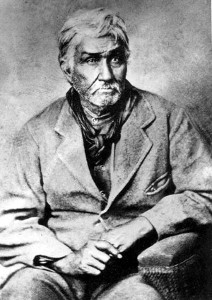Jesse Chisholm
Jesse Chisholm (1805 - March 4, 1868 ) was an American businessman and leader. He traded with the Indians and worked as a livestock guide in the Wild West . He is best known for the Chisholm Trail named after him , which was used for driving cattle between Texas and Kansas .
Life
Chisholm was probably born in the Hiwassee region of Tennessee in 1805 or 1806 . His father, Ignatius Chisholm, had Scottish ancestry and worked as a merchant and slave trader in the Knoxville area in the 1790s. Around 1800 he married a Cherokee in the Hiwassee area, who bore him three sons, of whom Jesse was the eldest. A time later, Ignatius Chisholm separated from Jesse's mother and went to Arkansas . Jesse Chisholm was likely brought to Arkansas by his mother around 1810. In the late 1820s, he joined the Cherokee and settled near Fort Gibson in what is now eastern Oklahoma. Chisholm became a trader and in 1836 he married Eliza Edwards, daughter of James Edwards, who ran a trading post in what is now Hughes County, Oklahoma . Chisholm brought trade goods south and west into pure Indian land. He spoke 14 dialects fluently and set up smaller trading posts. Soon he was in demand as a guide and interpreter. He gained trust due to his fairness and neutrality and also mediated between hostile tribes. Finally, he also translated treaties in Texas , Indian Territory, and Kansas .
He was active in Texas for almost 20 years. The President of the Republic of Texas, Sam Houston , who likely met Chisholm at Fort Gibson between 1829 and 1833 and married Chisholm's aunt, commissioned him to establish contact with the Plains Indians in West Texas. Chisholm played a leading role as translator and guide for various Native American groups in the Tehuacana Creek deliberations that began in the spring of 1843 when he got various tribes to take part in the negotiations near the Torrey brothers' trading post, eight miles south of today's Waco.
He continued to serve Houston for the next year and a half, and on October 7, 1844, Chisholm got Comanches and other tribes to attend the meeting in Tehuacana, where Houston was speaking. In February 1846, while visiting the Torreys Trading Post, Chisholm was enlisted to lead the Comanches to a consultation at Comanche Peak (now Glen Rose). The meeting took place on May 12th.
On December 10, 1850, Chisholm led representatives from seven tribes to a meeting on the San Saba River. During some of these consultations and on his trade trips, he succeeded in rescuing people from Indian captivity.
In 1858 Chisholm ended his travels in Texas and relocated his activities to western Oklahoma. He left the Cherokee Nation and settled in the Creek Nation near the mouth of the Little River in what is now Hughes County. At various times he operated trading posts at the end of the Great Plains , one near Lexington, now Cleveland County, and another in Council Grove near what is now Oklahoma.
Much of his trade was carried out in carts that went to the settlements of the Comanches and other Great Plains tribes. He rescued captured children and young people from the Comanches and Kiowas on various occasions . Most of these prisoners came from Mexico. He adopted these children and took them into his family.
In late 1861, he visited Kansas, where the Wichita , Waco, and other displaced Oklahoma tribes were living in camps. During the American Civil War he served the Confederates as a trader with the Indians, but in 1864 he became a translator for Union officers . During the war, Chisholm lived in the Wichita, Kansas area. Chisholm Creek in what is now the urban area is named after him.
In 1865 Chisholm and James R. Mead organized a wagon train at Fort Leavenworth and established a trading post in Council Grove on the North Canadian River near Lake Overhols in what is now Oklahoma. Many of his friends from Wichita followed him, and their route later became known as the "Chisholm Trail," which connected the ranches in Texas with the markets in Kansas.
In 1865 Chisholm attempted to organize a tribal council meeting in Little Arkansas, but not all tribes attended. In 1867, with the help of Black Beaver, the famous Delaware chief, he got the Plaines tribes to meet with government officials. The assembly developed the "Medicine Lodge Treaty". Chisholm died of food poisoning on March 4, 1868 in Left Hand Spring, what is now Geary, Oklahoma.
literature
- Stan Hoig: Jesse Chisholm: Ambassador of the Plains ; Niwot, Colorado: University of Colorado Press, 1991
- Thomas Ulvan Taylor: Jesse Chisholm ; Bandera, Texas: Frontier Times, 1939. Vertical Files, Barker Texas History Center, University of Texas at Austin.
Web links
- http://www.wilder-westen-web.de/vt001.htm
- http://www.genealogyimagesofhistory.com/rk-ro.htm
- http://www.tshaonline.org/handbook/online/articles/fch32
- http://www.vlib.us/old_west/trails/cthist.html
| personal data | |
|---|---|
| SURNAME | Chisholm, Jesse |
| BRIEF DESCRIPTION | American businessman and guide |
| DATE OF BIRTH | around 1805 |
| DATE OF DEATH | March 4, 1868 |


